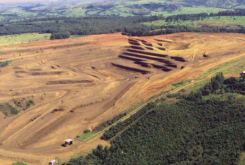Countering illicit operations in Mozambique
Despite efforts to counter both trades, illegal timber and fishing operations are continuing to erode Mozambique’s forests and fish populations. Chinese companies are heavily involved, with the support of local people in the case of illicit logging, although Maputo and Beijing have signed an agreement to tackle criminal foresting gangs. Yet the country’s tree cover is being eroded at an alarming rate, exacerbating the impact of extreme weather conditions.
Speaking in December, Mozambique’s Minister of the Sea, Inland Waters and Fisheries, Agostinho Mondlane, said that illegal fishing within Mozambique’s exclusive economic zone costs the Mozambican economy at least US$60 million a year. He said that regional and international cooperation was vital in tackling what is obviously a cross-border problem. Some unlicensed operators use banned nets and participate in illegal activities such as catching sharks purely for their fins. We covered the different types of illegal activity in more depth last May.
Mondlane said: “We have to be creative and find bolder ways so that surveillance can be really effective, and so that the struggle against illegal fishing can be won. We must continue to fight vigorously against the practices of under-declaring catches, the amount exported, and the values of sales abroad. For this, we must design and put into practice an efficient control and monitoring system”. At a conference last year, he argued: “we are witnessing the destruction of the mangroves and other ecosystems, which is clearly detrimental to the maritime environment”.
Although vessels from other countries are involved, including from the European Union, Chinese boats are identified more than any other. Research by the European Union found that most of the illegally caught fish ends up in China or Vietnam, but some is sold closer to home, in South Africa.Chinese vessels have been seized in Mozambican waters for many years, sometimes when they come into port for repairs, but the problem seems to be getting bigger.
Overfishing in the South China Sea has seen fish stocks nosedive there, pushing more Chinese vessels into other areas. Demand lies at the heart of the trade, as Chinese seafood consumption is increasing by 6% a year and it is very difficult to encourage consumers to eat more environmentally-friendly meals that do not contain fish or other animal products.
While port records provide an indication of the volume of illicit timber shipped from Mozambique to China, fishing vessels land do not tend to land their catch in containers and so captains can give false declarations about where they catch their fish. It is therefore difficult to calculate the scale of the problem.
Beijing has taken some steps to tackle the trade, including by lifting subsidies for vessels caught undertaking illegal fishing around the world. However, of the 78 companies operating the 264 Chinese vessels detected in illicit fishing globally in 2016 and 2017, just three had their distant water fishing licences withdrawn.
Tuna fishing
It was reported in the Mozambican press in December that the government had given operating licences to 114 Chinese fishing boats but this was denied by Mondlane, who said that no licences are given to foreign firms except for tuna fishing and even here foreign vessels had to have Mozambican licences. The government still hopes that state owned Tunamar will eventually operate its vessels after the company, in its previously incarnation as Ematum, became caught up in a well-publicised corruption scandal.
The government has encouraged Mozambican operators to buy new vessels but according to government figures, industrial and semi-industrial scale fishing boats account for just 8% of the annual catch, with small scale fishermen taking the remainder. A total of 242 large scale vessels had licences to fish in Mozambican Indian Ocean territory at the end of last year. However, these figures appear to cover only legitimate fishing and it seems likely that industrial vessels comprise a much bigger share of the illicit catch.
The total national annual catch increased from 290,915 tonnes in 2015 to an estimated 394,000 tonnes last year, while the volumes involved in unlicensed fishing are obviously more difficult to calculate. There are reports that caught fish could be transferred at sea between licensed and unlicensed vessels. Nevertheless, the government’s tax take from the sector has increased from 1% of the value of the annual catch in 2015-16 to 3% in 2018-19.
Licensed vessels are subject to inspection and satellite monitoring. There were 700 vessel inspections in the first eleven months of last year, of which 14% resulted in operators being fined a total of US$1.3 million for a variety of offenses, including fishing outside their licence areas and under reporting catches. With almost 3,000 kilometres of coastline, it is difficult for the authorities to patrol their vast maritime territory effectively. Tighter environmental restrictions have been introduced, including a ban on refuelling at sea, but again these will only be effective if there are regular inspections and substantial punishments for those contravening them.
At the end of 2017, President Filipe Nyusi launched the new “Policy and Strategy of the Sea” (POLMAR), to strengthen government control over the country’s maritime territory. It introduced the new fishing licences and aims to tackle illegal fishing and improve environmental protection. Work on building a Regional Fisheries Monitoring, Control and Surveillance (MCS) centre for the Southern African Development Community (SADC) in Maputo is due to get underway this year.
Tackling illegal logging
It is difficult to overplay the role of China in Mozambique’s forestry sector. The latter ships 93% of its licit timber exports to China, while the containers carrying illicit timber that have been detected at the ports of Beira and Maputo have also been bound for China.
It is a little easier to quantify the scale of illegal logging because timber is often transported in containers. The United Nations International Trade Statistics Database, otherwise known as UN Comtrade, reported that Mozambique officially exported 280,796 cubic metres of timber to China in 2013 but Chinese port records reveal that 601,919 cubic metres was imported into China from Mozambique, indicating that the difference was imported illegally. Many of Mozambique’s woods are highly prized in the manufacture of furniture, flooring and other consumer goods, and almost all of the timber exported to China comes from just five tree species.
It is accepted that the current rate of felling and depletion cannot be sustained, economically or environmentally. According to figures from the International Institute for Environment and Development (IIED), about 219,000 hectares of forest a year is felled in Mozambique and satellite imagery has improved data collection. The World Bank calculates that the forested area has fallen from 42 million hectares in the 1970s to 34 hectares last year.
While illegal logging attracts most attention, it is worth pointing out that it illicit forestry is not the biggest contributor. Again according to the World Bank, slash and burn agriculture accounts for 65% of forest loss in Mozambique, with logging contributing just 8%. Urbanisation adds another 12% and charcoal production 7%. In practice, many of these elements act together. Loggers take the biggest, most valuable trees and then small-scale farmers either cut the trees for charcoal or clear them for agriculture.
Forest cover provides some protection against flooding and erosion. Mozambique has suffered from severe flooding, most recently in March when Cyclone Idai struck the area around Beira, with the government predicting that the death toll may reach 1,000. Tree roots help to retain more moisture in the soil, so reduced tree cover allows rivers to fill more quickly.
Last June, the governments of Mozambique and China signed a memorandum of understanding on tackling illegal logging and promoting high quality, licit trade and processing. Although little detail has been made available, Beijing has pledged to encourage Chinese companies to invest in processing plants that will employ local people to give local communities a stake in supporting legal forestry.
Perhaps most importantly, a verification system is to be used to provide all timber consignments with bar codes to allow real-time tracking of where they come from, who owns them and where they are being processed. There are currently 630 forestry inspectors but it is generally reckoned that this figure will have to be tripled to make the verification system work. It is difficult to know whether the discovery of containers filled with illicit timber at Mozambican ports is a sign that the problem is getting worse or that the level of detection systems deployed is improving.
Processing priorities
The China in Mozambique’s forests: a review of issues and progress for livelihoods and sustainability report, published by the IIED last August agreed that licit Chinese operators and their Mozambican partners could extract more value from the trade by focusing on domestic timber processing, as the government has requested. The IIED recommends that timber licences are extended from the current five years up to 50 years, as this will give operators an incentive to operate their acreage on a more sustainable basis, including by nurturing smaller trees that are not immediately valuable.
As in all other sectors, processing raw materials at source adds value to exports and creates employment. New processing plants use modern equipment that makes better use of timber and reduces the number of trees felled for the same volume of wood. It would be particularly attractive to tie the ownership of processing plants to logging rights, as it is easier to process timber that is locally cut and so logging firms would be encouraged to improve the way that they look after their acreage. Processing plants can also include warehouses where wood can be dried to stop it warping on the journey to China.
International organisations that have examined the industry have asked Maputo to promote more community forestry management, as this would encourage sustainable development by creating local employment and engendering long term planning. Such an approach would probably generate less income in the short term and this may be crucial if the government continues its current policy.
There have been reports that illegal gangs pay local people to help them fell and transport trees but also that there could be support for the trade from officials.In May, Carta de Moçambique reported the chief attorney in Tete Province, Arsenia Matusse, as saying that there was “political interference” whenever the authorities sought to prosecute illegal Chinese loggers and so there were no successful convictions in the whole of 2018.



